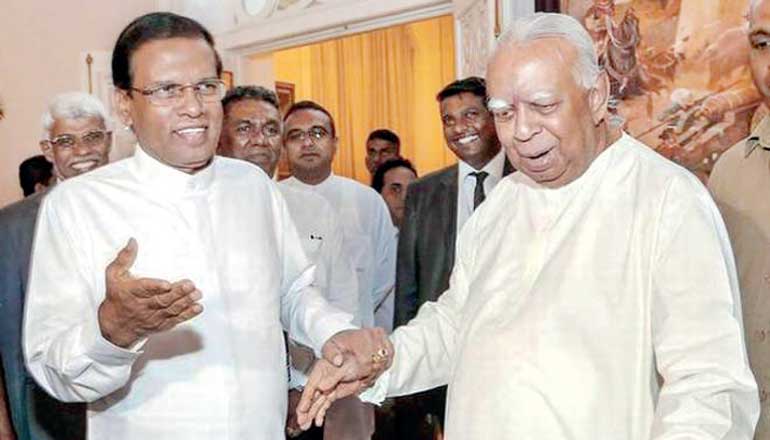Monday Feb 23, 2026
Monday Feb 23, 2026
Friday, 24 February 2017 00:00 - - {{hitsCtrl.values.hits}}
 Promises not kept: Sri Lankan President Maithripala Sirisena (left) and Leader of the Opposition R. Sampanthan.
Promises not kept: Sri Lankan President Maithripala Sirisena (left) and Leader of the Opposition R. Sampanthan.
By Meera Srinivasan
The Hindu: After two years of engaging the Sri Lankan Government on reconciliation and constitutional reform, the country’s Tamil polity seems to be losing patience, if Leader of the Opposition R. Sampanthan’s address in Parliament is any indication.
On Wednesday, the veteran Tamil leader attacked the Government that, he said, was treating the minority Tamils the same way the previous governments did. Pointing to two key issues — land and disappeared persons — the Tamil National Alliance (TNA) leader said: “Let me be frank. I am extremely unhappy with the way our people are treated by this Government with respect to their land.”
Over the last three weeks, families in the Mullaitivu District — that witnessed the last and most brutal phase of the civil war — are protesting, inspiring similar protests in other parts of the Tamil-majority Northern Province. They have only one demand — “release our land” taken over by the military.
Alluding to the Government’s perceived double standards in regard to disappeared persons, Sampanthan said: “So many soldiers are missing, their families are not protesting. The Government must be talking to them, offering some solace, there must be some conciliation. The same is not available to our people.”
The tone and content of his address, moving an adjournment motion, signalled a possible shift in the Tamil leader’s engagement with the Government.
Much the promise initially offered by this Government, which came to power with the overwhelming endorsement of Tamils and Muslims, was pegged to the positive and constructive relationship it had with the Tamil political leaders.
Though in the Opposition, the Tamil leaders had until now opted for cooperation over confrontation, voting favourably on its budgets and other proposals. Seen as willing partners, they are heavily criticised by political opponents for that approach. The same Tamil leadership that focussed largely on accountability over alleged war crimes when Mahinda Rajapaksa was in power, pragmatically shifted its goalpost to the new Constitution that President Maithripala Sirisena promised to deliver. After all, a just political solution was necessary to address the root cause of the conflict, they firmly believed, as did some other sections of Tamil intelligentsia and civil society. And now, even that endeavour of the Government appears to be on a sticky wicket, with sections within the Government strongly opposing a new Constitution, reportedly fearing they would lose a referendum that is needed to see it through. The TNA is keen on a referendum.
Speaking at a discussion on the new Constitution recently, TNA MP M.A. Sumanthiran underscored the point saying: “Reconciliation is important, but we don’t want it behind the backs of the Sinhala people. We want them to approve it.”
A Government that has not been able to move ahead despite a supportive Tamil ally in Sampanthan, may only find it harder to do so without him on board.